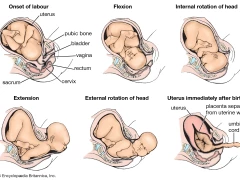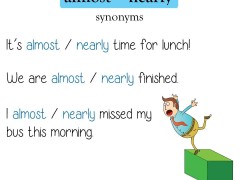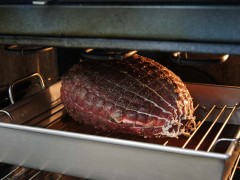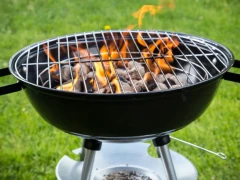bath [bɑːθ] n. 洗澡
【派】bathroom 浴室 bathtub 浴缸 bathe 沐浴
【搭】take a bath 洗澡 have a bath 洗澡
* * *
A: When you want a bath, just turn on the tap.
B: Is the water hot?
A:当你要洗澡时,打开水龙头。
B:水热吗?
* * *
nearly [ˈniəli] adv. 几乎,将近
【构】near(近的)+ly(副词后缀)=nearly(几乎)
【扩】almost 几乎 practically 几乎
* * *
A: How many hours have you put in on this project?
B: Nearly three months!
A:你在这个项目投入了多少时间?
B:将近三个月了。
* * *
ready [ˈredi] adj. 准备好的,完好的
【派】already 已经
【搭】get ready for 为……做好准备
be ready for 准备好做某事
* * *
A: Your document will be ready in about ten minutes.
B: Good. Please send it to my office then.
A:你的文件大约10分钟后就印好了。
B:好的,到时候请送到我的办公室来。
* * *
dinner [ˈdinə] n. 正餐,晚餐
【派】diner 用餐者
【搭】dinner table 饭桌
* * *
A: Stay for dinner, unless you're busy.
B: Thanks. But I have to go to the post office now.
A:如果你不忙,就留下来吃饭吧。
B:谢谢,但是我现在得去邮局。
* * *
restaurant [ˈrestərənt] n. 饭馆,餐馆
roast [rəust] adj. 烤的
【派】roaster 烘烤机
【扩】baked 烤的
【搭】roast beef 烤牛肉 roast duck 烤鸭
* * *
A: I want to try Beijing Roast Duck tonight.
B: No problem. I'll arrange it at once.
A:今天晚上我想去尝尝北京烤鸭。
B:没问题,我马上去安排。
Lesson 82 I had...我吃(喝、从事)了……
breakfast [ˈbrekfəst] n. 早饭
【构】break(打破)+fast(禁食期)=breakfast(早餐)
【搭】at breakfast 早餐时
* * *
A: I didn't have breakfast this morning.
B: You know, it's bad for your health.
A:我今天早上没吃早饭。
B:你知道,这对你的健康不利。
* * *
haircut [ˈheəkʌt] n. 理发
【构】hair(头发)+cut(剪)=haircut(理发)
【扩】coiffure 发型
【搭】get a haircut 理发
* * *
A: You must have a haircut.
B: But I don't think my hair is very long.
A:你必须去理发了。
B:但我不认为我的头发很长啊。
* * *
party [ˈpɑːti] n. 聚会
【扩】gathering 聚会
【搭】hold a party 举办聚会
* * *
A: I have to find something for tomorrow's party.
B: Do you want me to help you?
A:我得去买点儿东西为明天的聚会做准备。
B:要我帮你吗?
* * *
holiday [ˈhɔlədei] n. 假日
【搭】public holiday 法定假日
on holiday 在度假
* * *
A: I'm going to have a good holiday.
B: How long will it be?
A:我将要去度假。
B:你的假期有多长时间?
noun [具体名词]浴缸,浴盆;洗澡,沐浴;浴室;池,盆 - The midwife gave him a warm bath.
verb [vi. 不及物动词]给…洗澡;洗澡,沐浴 - The midwife gave him a warm bath.
noun [专属名词]出生,诞生;出身,血统;开始,起源 - It was the birth of his grandchildren that gave him greatest pleasure.
verb [vi. 不及物动词]<北美,非正式>生,产 - Sadrudin was an Iranian by birth.
adverb [程度副词]几乎,差不多;密切地,亲密地;即将,就要 - The beach was nearly empty.
adjective [原级](某人)准备好(做某事)的;预先备好的,可供使用的;乐意的;方便使用的,现成的;迅速的,敏捷的;即将…的;需要的,想要的 - It took her a long time to get ready for church.
noun [抽象名词]<英,非正式>现款(the ready/readies);预备好的状态 - Everybody ready? It's showtime!
adverb [程度副词]已做完,已完成 - I didn't have a ready answer for this dilemma.
verb [vi. 不及物动词]<正式>做好…的准备 - John's soldiers were readying themselves for the final assault.
verb [vt. 及物动词]阅读,读懂;朗读;(在书籍、报纸等中)读到,看到;解读,(按某种方式)理解;看透(想法或心思);读起来(给人以某种印象);有…的字样,写着;换用,改作(用于订正讹误);读取 - When you read a piece of writing to someone, you say the words aloud.
noun [具体名词]<英,非正式>阅读,阅读时间;<英,非正式>读物;<美>解释,阐明 - I settled down to have a good read.
adjective [原级]博学的,有学问的 - Have you read this book?
作为动词:
- 表示阅读、理解文字:例如,I like to read novels in my free time.(我喜欢在空闲时间读小说。)
- 表示朗读、念出:例如,She read the poem aloud to the class.(她向班级大声朗读了那首诗。)
作为名词:
- 表示已经阅读过的内容:例如,I have a long reading list for this summer.(我有一个很长的暑假阅读清单。)
- 表示文学作品:例如,He enjoys classic reads.(他喜欢经典的文学作品。)
衍生短语和习语:
- Read up on: 研究、学习某个主题或领域的知识。例如,I need to read up on the latest research in neuroscience.(我需要研究一下神经科学领域的最新研究。)
- Read between the lines: 阅读行间之意,从言外之意中理解真正的含义。例如,His message was vague, but I could read between the lines and understand what he meant.(他的话含糊不清,但我能够读懂其中的言外之意,理解他的意思。)
- Read someone like a book: 轻易看透某人的想法和意图。例如,She can read him like a book; she knows exactly what he's thinking.(她能轻易看透他的想法,她清楚地知道他在想什么。)
常见的短语
"read"与许多不同的短语和表达搭配使用。以下是一些常见的例子:
1. Read a book: 阅读一本书
2. Read a newspaper: 阅读报纸
3. Read a magazine: 阅读杂志
4. Read an article: 阅读一篇文章
5. Read a poem: 朗读一首诗
6. Read a story: 阅读一个故事
7. Read a novel: 阅读一本小说
8. Read a biography: 阅读一本传记
9. Read a document: 阅读文件
10. Read a manual: 阅读操作手册
11. Read a contract: 阅读合同
12. Read a letter: 阅读一封信
13. Read a text: 阅读一个文本
14. Read a blog: 阅读博客
15. Read a tweet: 阅读推文
16. Read a recipe: 阅读食谱
17. Read a label: 阅读标签
18. Read a map: 阅读地图
19. Read a sign: 阅读标志牌
20. Read someone's mind: 猜透某人的想法
这些短语表示了不同的阅读对象,可以根据具体情境来选择适当的搭配。同时,还有许多其他与"read"相关的短语和习语,如"read up on"(研究、学习某个主题),"read between the lines"(领悟言外之意),"read like a book"(了解某人的想法和意图)等。
noun [专属名词]正餐,晚餐;晚宴,宴会;速食饭,方便饭 - Shall we have trout for dinner?
noun [专属名词]晚餐(尤指在家吃的非正式晚餐);夜宵,宵夜;<美>(尤指为慈善事业筹款举办的)晚餐会;<苏格兰>一种薯片伴特定事物的餐食 - He had vomited up his supper.
verb [vi. 不及物动词]给…供餐;吃晚饭 - Who's going to cook supper?
noun [专属名词]餐馆,饭店 - We had a meal in a restaurant.
verb [vt. 及物动词]炙,烘(食物,尤指肉);<非正式> 严厉批评,斥责;<美, 非正式> 和善地戏弄;<非正式> (尤指通过暴露在太阳下或炉火前)使受热发烫;以火刑折磨;烘干,烘焙(食品原料,金属矿等);焙,炒(坚果、豆子等);变热 - I personally would rather roast a chicken whole.
noun [专属名词](大块)烤肉,待烤的肉;<美>(讲述主角趣事的)庆祝会;户外烧烤野餐;烤,炙,烘(尤指咖啡);(某种)烘过的咖啡 - A roast is a piece of meat that is cooked by roasting.
adjective [原级]烘烤的,烤制的 - Roast meat has been cooked by roasting.
noun [专属名词]烤架;带烤架的炊具;电焙盘;一盘烧烤食物(尤指烤肉);烤肉店;门窗护栏(同 grille) - I'll grill the lobster.
verb [vi. 不及物动词]烧烤,烤制;盘问,追问 - The grill can't be used to cook the steaks.
noun [专属名词]户外烧烤;(户外烧烤用的)烤肉架;烧烤食物 - Let's have a barbecue!
verb [vi. 不及物动词](在烤架上)烧烤 - Barbecue is my love.
noun [专属名词]早餐;早餐的,早餐时用的 - Your breakfast is coming soon.
verb [vi. 不及物动词]吃早餐 - The men ate a hearty breakfast.
adjective [原级]快的,迅速的;系牢的,紧缚的;寻欢作乐的;不褪色的;忠实的,可靠的 - The only question is how fast the process will be.
adverb [程度副词]快速地;坚定地,牢固地 - It would be nice to go faster and break the world record.
verb [vi. 不及物动词]斋戒,禁食 - I fasted for a day and a half and asked God to help me.
noun [专属名词]斋戒,斋戒期 - The fast is broken at sunset, traditionally with dates and water.
noun [专属名词]理发;发型 - Your hair is all right; it's just that you need a haircut.
noun [集合/集体]聚会,派对;政党,党派;<正式>(契约或争论的)当事人,一方;队,组,群;<正式>参加者;<非正式>人 - A party is a social event, often in someone's home, at which people enjoy themselves doing things such as eating, drinking, dancing, talking, or playing games.
verb [vi. 不及物动词]<非正式> 尽情欢乐,欢宴 - If you party, you enjoy yourself doing things such as going out to parties, drinking, dancing, and talking to people.
adjective [原级](纹章)分割开的,分成不同颜色部分的 - It has to be proved that they are the guilty party.
noun [专属名词]假日;度假期;法定节假日,节日;(分期付款、税费等的)暂缓缴付期 - A holiday is a period of time during which you relax and enjoy yourself away from home. People sometimes refer to their holiday as their holidays. (
verb [vi. 不及物动词]度假 - If you are holidaying in a place away from home, you are on holiday there. (
noun [专属名词](学校的)假期,(法院的)休庭期;<美>休假,假期;腾出,辞去 - A vacation is a period of the year when schools, universities, and colleges are officially closed. (
verb [vi. 不及物动词]<美>度假 - We're going to the beach for vacation.
















